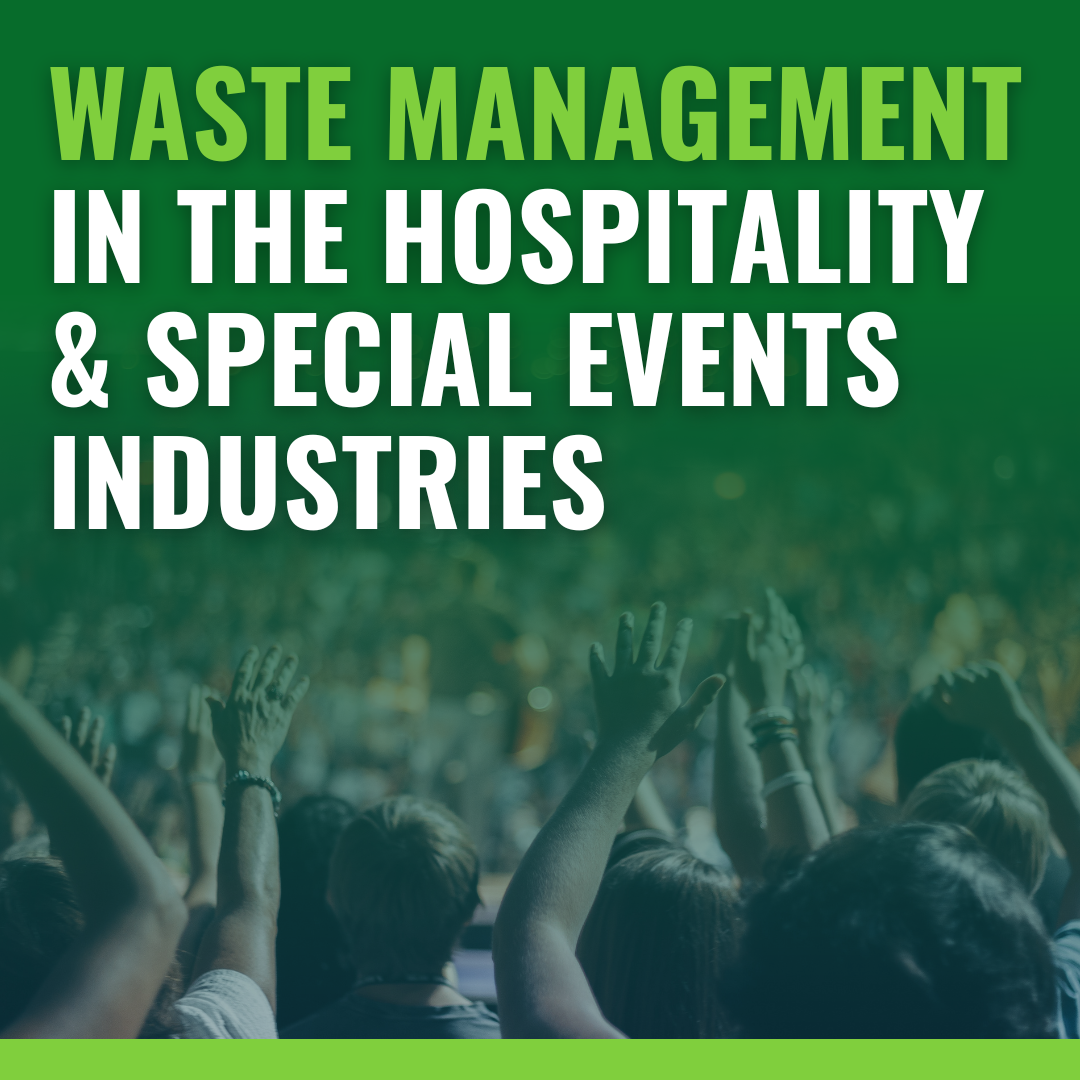We use cookies to make your experience better. To comply with the new e-Privacy directive, we need to ask for your consent to set the cookies. Learn more.
Waste Management in the Hospitality and Special Events Industries
Special events can be huge economic drivers for municipalities, venues, and food service providers — but they also come with unique waste management challenges. The goal for any large-scale entertainment operation is to manage waste both safely and efficiently. In order to do that, managers must carefully plan multi-stream waste systems, and they must provide staff with the tools they need to safely route each type of waste toward its own unique destination.
So how big is the challenge? The volume of waste produced at your average sporting event or major theme park can be shocking; a waste audit of Memorial Stadium, home of the University of Missouri Tigers, found that fans and staff generated 47.3 metric tons of waste over the course of five games.

Interestingly, unsold food and scraps made up 96 percent of the waste generated in this study. As Mizzou and similar major sporting venues, concert halls, theme parks, city festivals, and even shopping malls work toward zero-waste solutions, routing different types of waste — particularly food waste — toward different disposal solutions will create parallel waste streams: one for recycling, another for composting or anaerobic digestion, and, perhaps, a third for traditional landfill disposal.
Here are a few tips to keep in mind when planning a waste handling system for major entertainment ventures:
-
Think beyond composting.Industrial-scale composting of food scraps is a terrific option, but venues with a little more capital might consider following in the Magic Kingdom at Walt Disney World's footsteps. This legendary theme park routes some portion of food scraps and byproducts of the cooking process, like oil and grease, to huge "anaerobic digesters."
These large tanks combine waste with microorganisms to create "biogas," a flammable blend of carbon dioxide and methane. From the tanks, the biogas goes straight to generators, where it produces enough energy for 2,000 Florida homes.
Finally, the nutrient-rich solids left over at the end of the process make great fertilizer for local farmers. It's a complete circular economy — its own "magic kingdom," indeed.
-
Make recycling bins highly visible.Visitors at a county fair or a music festival aren't always thinking about environmental stewardship. However, when you place clearly identified recycling bins at regular intervals on your grounds, folks are more likely to remember that's where they should toss an empty plastic bottle.
The EPA recommends collecting recycling at every point of generation within sports stadiums, for instance. That includes parking lots, where tailgating events can produce lots of glass and aluminum, as well as concessions areas, restrooms, hallways, and within the bleachers themselves.
-
Create a safe and dependable logistics system for each waste stream.Whether you're handling recyclables or food scraps, waste at large venues must move from disparate collection points into large, single-point dumpsters for collection or transport to final points of disposal.
This fundamental movement can present serious hazards to staff. According to the EPA, a gallon of food waste weighs about 3.8 pounds; that means a full 32-gallon trash can easily weigh 120 pounds or more. At just 50 pounds, the risk of injury to the lifter increases, reports OSHA.
Meanwhile, some composting facilities regularly empty 660-Liter (174-gallon) wheelie bins. There's no question of staff lifting these containers unassisted.
The solution in both cases is to provide staff with Bin Dumpers from Solus Group. For a facility that collects 32-gallon bins, the highly portable Multi-Tip will do the job. To lift the 660-Liter Mobile Garbage Bins, opt for the Dumpmaster, which has a capacity of up to 660 pounds.
Municipal Events and Equipment Rental
While it makes sense for a permanent theme park or sports venue to keep a fleet of Bin Dumpers permanently on hand, what about the yearly city festival or county fair? In these cases, many local administrators choose to rent or lease waste handling equipment like Bin Dumpers.
On the other hand, if there's room in the city budget for a Bin Dumper or two, municipalities will certainly find applications to use them year round. After all, while festivals may arrive in the summer, waste management itself occurs in every season.
References:
"Ergonomics eTool: Solutions for Electrical Contractors." OSHA. Occupational Safety and Health Administration, n.d. Web. 10 Dec. 2017.
Gunther, Marc. "Disney World's biogas facility: a model for converting food waste into energy." TheGuardian. Guardian News and Media Limited, 17 Oct. 2014. Web. 10 Dec. 2017.
Sossamon, Jeff. "MU Study Reveals Ways in which Collegiate Sports Venues can Move Beyond 'Zero Waste.'" Missouri.Edu. University of Missouri News Bureau, 30 Aug. 2017. Web. 10 Dec. 2017.
"Volume to Weight Conversion Factors." EPA. U.S. Environmental Protection Agency, Apr. 2016. PDF. 10 Dec. 2017.
